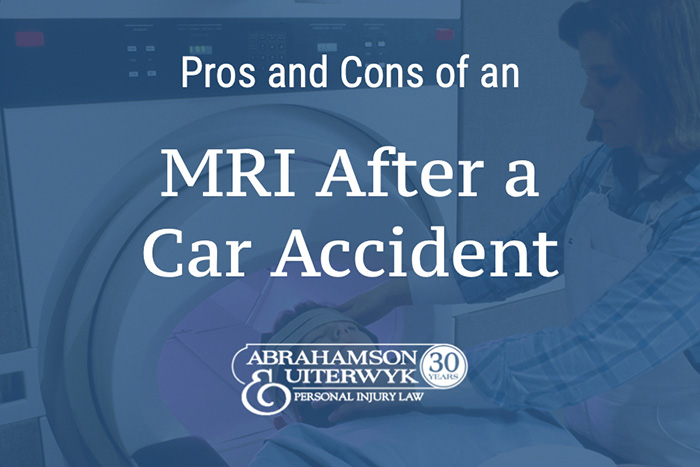Yes, depending on the severity of your injuries, you may need an MRI after a car accident. MRI stands for magnetic resonance imaging. It is a diagnostic test that allows doctors to see images of your non-bone matter. If you’re wondering when to have an MRI after a car accident, it is usually best to have it within a few days of your car accident. Under Florida’s 14-day accident law, seeking medical treatment within 14 days of your accident is advisable.
Not all injuries show on a negative x-ray. Injuries involving spinal discs won’t show on an X-ray. Doctors need to order an MRI to diagnose your pain source.
However, undergoing an MRI has pros and cons. If your injuries are severe enough to warrant an MRI, consider hiring a Florida auto accident attorney who can help.

At Abrahamson & Uiterwyk, we have over 35 Years of experience assisting Florida clients with their injury needs. As a trusted Tampa car accident lawyer, we know the pros and cons of an MRI. We can help you understand exactly how an MRI works and whether it’s right for your situation.
Common Injuries That May Need an MRI
Because an MRI can show injuries not visible on X-rays, doctors may order one for pain complaints involving:
- Muscles,
- Joints,
- Sprains,
- Bones,
- Nerves, and
- Brain.
Some of the most common injuries in a car accident that lead a doctor to order an MRI include, but are not limited to, herniated discs, torn ligaments or tendons, spinal cord compression, and traumatic brain injuries.
MRIs can also diagnose many other health conditions that are not related to an auto accident, such as cancerous tumors, arthritis, stroke, and multiple sclerosis.
Here’s How an MRI Works
When you have an MRI, you lie down in a tube, which scans your body. You won’t feel any pain from the MRI test itself.
However, you might experience some general discomfort because you’re required to stay still for an extended period of time. If you move during the scans, the images may be unusable.
MRIs use magnets to look for diseased cells. Each of your body’s cells has a positive and negative pole. When you go for an MRI, the magnet looks at all the normal cells in your body.
Diseased cells won’t line up like their healthy counterparts. The magnet allows radiofrequency waves to create an image that doctors can use to pinpoint what is causing your pain.
When You Should Consider Getting an MRI Scan After Car Accident
Getting an MRI can be a critical step in correctly diagnosing your injuries after your car accident. If you believe you have a spinal cord injury, neck or back injury, or if you suspect a brain injury, an MRI could help determine what is wrong and the extent of your injuries.
The MRI will allow your medical providers to tailor treatment to the exact area of injury.
If you have severe pain in your neck or back, or if you have a suspected head or brain injury, you need to insist on an MRI. Pain that radiates down your arm or leg suggests nerve involvement.
Your MRI results can show whether your condition requires surgical intervention. If your injuries are severe enough for surgery, you could have permanent damage if you delay having it.
Injuries like nerve compression are serious. If your injured spinal disc continues to push on that nerve, the damage may be irreversible.
MRIs can also boost the value of your accident claim. Insurance companies typically don’t give much weight to soft tissue injuries. That is because most of these claims are subjective, allowing the adjuster to undervalue them or dismiss them entirely.
If you have an MRI that shows nerve compression or a herniated disc, it forces the insurance company to acknowledge your injuries, as there is an objective medical diagnosis.
When You May Not Want to Get an MRI
One of the main disadvantages of an MRI is the cost. In many cases, it will cost a thousand dollars or more. Even if you have health insurance, you could have a high co-pay.
If you are successful in your auto accident injury claim, your settlement should include compensation for your medical treatment, including the MRI costs.
For most people, there is no medical risk of having an MRI. However, the strong magnetic field is problematic for some people.
People who have surgical implants, especially those with iron or select types of steel, could have complications. Other magnetizable objects to disclose include a pacemaker, insulin pumps, endoscopy capsules, cochlear implants, etc.
People with claustrophobia have problems getting an MRI. The tube can be a snug fit, and that only adds to the anxiety for some patients. MRI techs might try coping mechanisms like having you listen to music.
There are also new open MRI machines that can help those with severe claustrophobia. However, these can be even more expensive and may have much longer wait times to get an appointment.
How We Will Help with Your Case
Hiring a car crash injury lawyer is crucial if you sustained injuries in a car accident caused by someone else’s negligence. Your potential settlement value is directly linked with the experience of your Florida auto accident attorney.
At Abrahamson & Uiterwyk, we’ve recovered hundreds of millions of dollars for our clients. Some of these individual settlements were in the seven-figure range.
We understand what makes a successful auto accident claim. When you retain us to represent you, we will immediately start an independent investigation.
We will talk to witnesses, gather evidence, order your medical records, and more. We will handle all communications with the at-fault party’s insurance and negotiate your potential settlement. We understand how complicated injury cases can be, especially herniated disc injury settlements with steroid injections and surgery.
The insurance company can’t take advantage of your inexperience with the claims process when you have an attorney representing your interests. Insurance adjusters are notorious for undervaluing claims and wrongfully denying valid ones.
We will hold the responsible party accountable and ensure the insurance adjuster extends a fair settlement offer. If they don’t, we are prepared to file a lawsuit on your behalf and work to resolve your claim during litigation.
To learn more about how we can help, contact Abrahamson & Uiterwyk today to schedule an initial consultation with our experienced Florida car accident attorneys.
Get Your Accident Questions Answered
Understandably, prospective clients have numerous questions about MRIs and auto accident injuries. We’ve compiled answers to some of the most common questions we receive regularly.
When Should I Get an MRI After a Car Accident?
If you’re wondering when you should get an MRI after a car accident, it is usually best to have an MRI within a few days of your car accident. If you are seeking medical treatment for injuries sustained in an auto accident, and a doctor requests an MRI, you should schedule one right away.
Due to Florida’s 14-day accident law, you should seek medical treatment within 14 days of your accident for your personal injury protection (PIP) coverage to apply.
What Happens If I Don’t Have an MRI After a Car Accident?
If your doctor orders a referral for an MRI and you choose not to get one, it could cause harm to you physically. It could also hurt your case’s value, allowing the at-fault party to reduce their settlement offer. They will claim your injuries aren’t that serious.
How Long Does an MRI Take to Complete?
The length of time you’ll be in the tube depends on several factors, including what part of the body they are testing, and the number of scans required for the MRI. Accident-related injuries can require scans that last anywhere from 15 to 90 minutes in most cases.
Are There Alternatives to an MRI Scan If I Have Metal in My Body?
You need to speak with your doctor about what implants and medical devices you have in your body. Some metals are MRI-compatible, while others are not. In some cases, your doctor may order a CT scan, but the images are not as detailed, and you’ll be exposed to higher levels of radiation.
What If My MRI Shows Nothing After a Car Accident?
If your MRI doesn’t reveal any injuries, that doesn’t mean your pain isn’t real. Some injuries—like soft tissue damage or nerve irritation—may not show up clearly on an MRI. In these cases, your doctor may rely on your symptoms and other tests to guide treatment.

